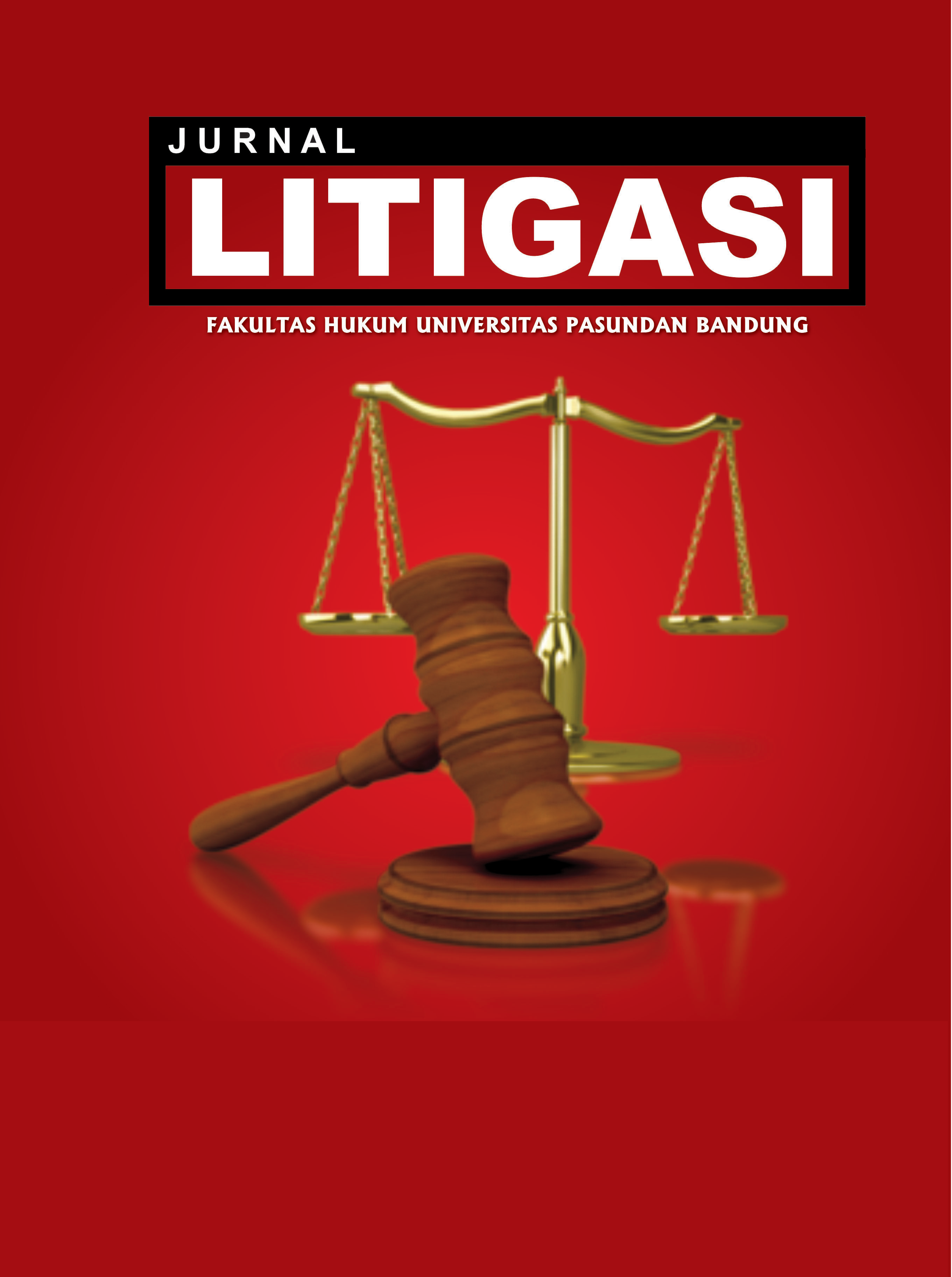PENDIDIKAN SOCIAL JUSTICE DI MASA PANDEMI COVID-19 : PERTIMBANGAN DAN KEKHAWATIRAN
DOI:
https://doi.org/10.23969/litigasi.v22i2.3841Abstract
The outbreak of the Covid-19 virus has caused disruptions across the globe. The table has turned drastically and unexpected. All aspects of life are impacted by this corona virus. The world, ready or not are forced to adapt with the situation. Legal schools have to conduct online learning. The concern should be paid to how social justice education can be done online when trying to sensitize the students towards social justice. The approach used in this research was juridical normative examining norms related to social justice learning. Conceptual approach was used to show views and analysis of problem solving on social justice learning through online method at undergraduate level to produce lawyers with legal professional skills. Therefore, traditional law school curricula provide chances for students to develop their skills. The impact is that online learning that can produce future litigators with the same or even better quality with the conservative method is still in doubt. The research concluded that some elements are missing from the online learning when teaching social justice to students such as professional skills and social emphathy.
Keywords: Outbreak of Covid-19 Virus, Online Learning, Social Justice.
Downloads
References
Assareh, A., & Hosseini Bidokht, M. (2011). Barriers to E-teaching and E-learning. Procedia Computer Science, 3, 791–795. https://doi.org/10.1016/j.procs.2010.12.129
Barnes, C. (2017). An Analysis of Student Perceptions of the Quality and Course Satisfaction of Online Courses. Journal of Higher Education Theory and Practice, 17(6), 2017. https://www.researchgate.net/publication/317138073
Bloch, F. S. (2011). The Global Clinical Movement, Educating Lawyers for Social Justice (F. S. Bloch (ed.)). Oxford University Press. https://doi.org/10.1093/acprof:oso/9780195381146.001.0001
Charlton, J. P., & Danforth, I. D. W. (2007). Distinguishing addiction and high engagement in the context of online game playing. Computers in Human Behavior, 23(3), 1531–1548. https://doi.org/10.1016/j.chb.2005.07.002
Dao, D., & Ochola, E. (2019). Effective Online Course Design in a Learning Management System Has Strong Impacts on Student Learning Achievement: A Case Study at a University in Iowa Social Media Sites Enhance Online Teaching and Learning Activities: Instructors’ Perceptions: A Case St. December. https://www.researchgate.net/publication/338052531
Hardika. (2012). Pembelajaran Transformatif Berbasis Learning How to Learn: Teori, Model, dan Implementasinya dalam Pembelajaran. UMM Press.
hundred.org/ OECD. (2020). Spotlight: Quality education for all during COVID-19 crisis. In Spotlight: Quality education for all during COVID-19 crisis (Issue April). https://hundred-cdn.s3.amazonaws.com/uploads/report/file/15/hundred_spotlight_covid-19_digital.pdf
Mather, M., & Sarkans, A. (2018). Student Perceptions of Online and Face-to-Face Learning conditions of the Creative Commons Attribution license (CC BY-NC-ND). International Journal of Curriculum and Instruction, 10(2), 61–76.
Michael Woods, M. (2014). Screen Time May Affect Social Interaction Skills in Children. Winchester Hospital.
Muilenburg, L. Y., & Berge, Z. L. (2005). Students Barriers to Online Learning: A factor analytic study. Distance Education, 26(1), 29–48. https://doi.org/10.1080/01587910500081269
Olcott, D., Carrera Farran, X., Gallardo Echenique, E. E., & González Martínez, J. (2015). Ethics and Education in the Digital Age: Global Perspectives and Strategies for Local Transformation in Catalonia. RUSC. Universities and Knowledge Society Journal, 12(2), 59. https://doi.org/10.7238/rusc.v12i2.2455
Omoregie, M. (2012). Distance Learning: An’Effective Educational Delivery System. 1, 1–32. papers3://publication/uuid/A0A266F4-18E4-41C4-B1F6-EDFB58C6E8CE
Orlando, J., & Attard, C. (2016). Digital natives come of age: the reality of today’s early career teachers using mobile devices to teach mathematics. Mathematics Education Research Journal, 28(1), 107–121. https://doi.org/10.1007/s13394-015-0159-6
Rahardjo, S. (2009a). Hukum dan Perubahan Sosial. Genta.
Rahardjo, S. (2009b). Pendidikan Hukum Sebagai Pendidikan Manusia. Genta.
Regmi, Krishna & Jones, L. (2020). A systematic review of the factors – enablers and barriers – affecting e-learning in health sciences education. BMC Medical Education 20, 1(91). https://doi.org/https://doi.org/10.1186/s12909-020-02007-6
Srichanyachon, N. (2014). The barriers and needs of online learners. Turkish Online Journal of Distance Education, 15(3), 50–59. https://doi.org/10.17718/tojde.08799
Stavrou, P. D., & Kourkoutas, E. (2017). School Based Programs for Socio-emotional Development of Children with or without Difficulties: Promoting Resilience. American Journal of Educational Research, 5(2), 131–137. https://doi.org/10.12691/education-5-2-4
Suprijono, A. (2015). Cooperative Learning. Pustaka Pelajar.
Susanto, Anthon F.; Rahayu, Mella Ismelina Farma; Septianita, Hesti; Tedjabuwana, Rosa; Sukma, L. (2020). Pendidikan Hukum dan Kearifan Lokal (1st edition). Logoz.
Suyono; Hariyanto. (2016). Belajar dan Pembelajaran: Teori dan Konsep Dasar. Rosda Karya.
Thanaraj, A., & Sales, M. (2015). Lawyering in a Digital Age: A Practice Report Introducing the Virtual Law Clinic at Cumbria. Int’l J. Clinical Legal Educ., 22(03), 1–29. http://heinonline.org/hol-cgi-bin/get_pdf.cgi?handle=hein.journals/clled22§ion=17
Torres-Harding, S., Baber, A., Hilvers, J., Hobbs, N., & Maly, M. (2018). Children as agents of social and community change: Enhancing youth empowerment through participation in a school-based social activism project. Education, Citizenship and Social Justice, 13(1), 3–18. https://doi.org/10.1177/1746197916684643
Twenge, J. M., & Campbell, W. K. (2018). Associations between screen time and lower psychological well-being among children and adolescents: Evidence from a population-based study. Preventive Medicine Reports, 12, 271–283. https://doi.org/10.1016/j.pmedr.2018.10.003
Whitley, C. T., & Yoder, S. D. (2015). Developing social responsibility and political engagement: Assessing the aggregate impacts of university civic engagement on associated attitudes and behaviors. Education, Citizenship and Social Justice, 10(3), 217–233. https://doi.org/10.1177/1746197915583941.
Downloads
Submitted
Accepted
Published
How to Cite
Issue
Section
License
Copyright (c) 2021 JURNAL LITIGASI (e-Journal)

This work is licensed under a Creative Commons Attribution 4.0 International License.
Copyright © 2026 Jurnal LITIGASI (e-Journal).
Jurnal LITIGASI (e-Journal) adopts the CC-BY license as the optimal license for publishing, distributing, using, and reusing scholarly work. Authors who publish with this journal retain copyright and grant the journal right of first publication with the work simultaneously licensed under a Creative Commons Attribution 4.0 International License (CC-BY 4.0). This license allows others to share, copy, distribute, and adapt the work, provided that the work's authorship and initial publication in this journal are properly cited.






























